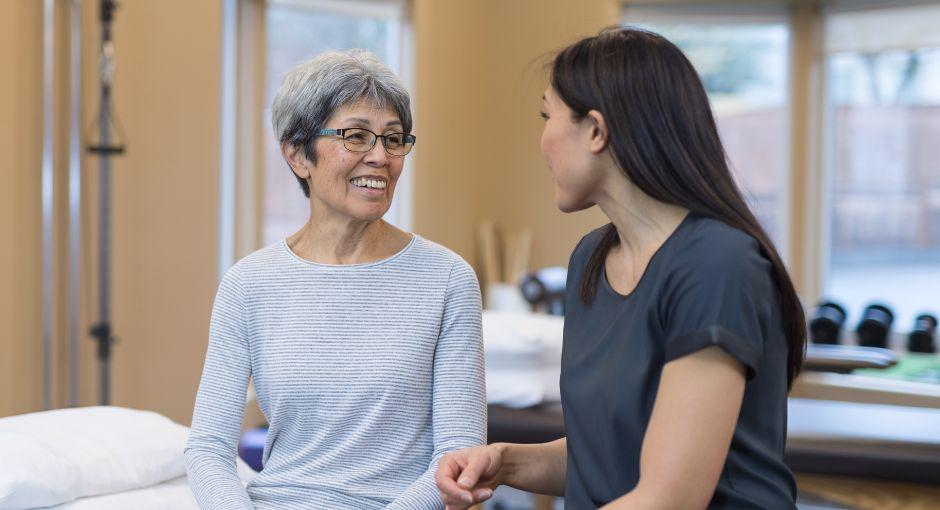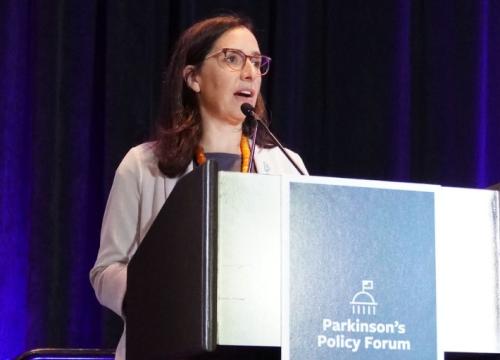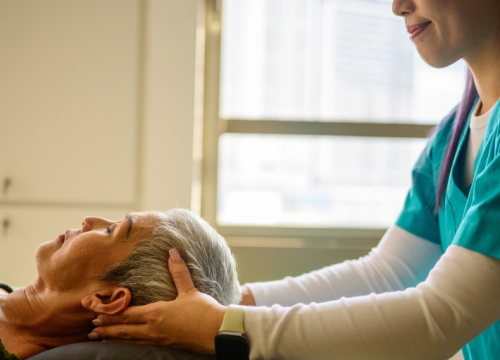Conversations with 4 Essential Members of Your Parkinson's Care Team

Living well with Parkinson’s takes a team, and some of the most valuable members may not be who you would typically expect. Healthcare professionals, such as physical and occupational therapists, are essential members of your Parkinson’s care team. They help you maintain mobility, independence and communication, working hand-in-hand with movement disorders specialists and neurologists to create a comprehensive, well-rounded care plan that supports your individual needs and overall well-being.
To showcase these key members of your Parkinson’s care team, we’re highlighting recent podcast episodes that explore the unique benefits of working with a diverse group of medical specialists.
Who should we talk to next? Let us know
Speech-Language Pathologist
Episode 176: The Challenges of Speech and Swallowing Issues
Parkinson’s affects more than just movement, it can also impact the small muscles in the face, mouth, throat and chest. These changes may impact your ability to eat, speak and swallow, and can influence your confidence in conversations. A speech-language pathologist will assess speech and swallowing challenges and create a treatment plan to help manage these symptoms.
Melissa Grassia Chisholm, MS, CCC-SLP, a licensed speech pathologist and a voice-swallow airway expert, talks about the importance of getting a baseline evaluation with a speech-language pathologist early on in your PD diagnosis and explains how personalized treatment plans can help address speech and swallowing challenges as your needs evolve.
Physical Therapist
Episode 171: Physical Therapy Recommendations for Exercising Safely
As Parkinson’s progresses, overall movement, balance, and coordination may become more challenging. A physical therapist helps you stay active by developing a custom training plan that meets your goals and physical needs.
Patricia S. Brown, PT, DPT, NCS, of Chapman University in California, a physical therapist who specializes in neurological diseases, shares her recommendations on staying motivated and choosing an exercise program that matches your lifestyle goals.
Pharmacist
Episode 167: Exploring Carbidopa-Levodopa for Treating Parkinson’s Symptoms
Managing Parkinson’s symptoms often involves taking multiple medications, making ongoing conversations with your doctor essential. When questions arise, pharmacists can be readily accessible experts who can help address concerns, identify potential drug interactions, and make you feel more confident about your medications.
Emily Peron, PharmD, MS, and Leslie Cloud, MD, MSc, from Virginia Commonwealth University, a Parkinson’s Foundation Center of Excellence, explain the long-term use considerations of carbidopa-levodopa, the different formulations available, and how to recognize when medication adjustments may be needed.
Episode 181: What to Know Before Taking Nutritional Supplements for Parkinson’s
In addition to prescribed Parkinson’s medications, people with PD may explore complementary or alternative therapies, such as herbs or nutritional supplements. Although often available without a prescription, these supplements can pose risks, especially when taken alongside PD medications. That’s why it’s always advisable to speak with your healthcare provider before starting a new medication or over-the-counter supplement.
Angela Hill, Pharm. D., CRPh, a pharmacist and professor at the University of South Florida, a Parkinson’s Foundation Center of Excellence, talks about the potential side effects and drug interactions that can happen with nutritional supplements, and offers tips for reading and evaluating food labels so you can better understand what you’re taking.
Social Worker
Episode 179: Understanding Depression, Anxiety, and Apathy
Social workers are often the go-to resource for connecting you with specialists and services that can help you navigate the day-to-day realities of Parkinson’s. They offer a wealth of guidance and support to ensure that your voice is heard.
Lauren Zelouf, MSW, LCSW from Penn Medicine’s Parkinson’s Disease & Movement Disorders Center, a Parkinson’s Foundation Center of Excellence, tackles the often-overlooked topic of mental health. She breaks down the differences between depression, anxiety and apathy, and offers coping strategies for managing symptoms and finding support.
Managing Parkinson’s involves a team-based approach. Each healthcare professional brings specialized expertise that can help you move better, speak more confidently, and feel better supported throughout your Parkinson’s journey.
Coming Soon: We’re excited to feature another essential member of the Parkinson’s care team—an occupational therapist—in an upcoming episode.
Subscribe to our podcast. Search for “Substantial Matters: Life and Science of Parkinson’s” on your favorite podcast platform.
Listen to every episode at Parkinson.org/Podcast.
Related Materials
Related Blog Posts

Shaping the Future of Parkinson’s Policy: Meet Our Chief Strategy and Policy Officer

